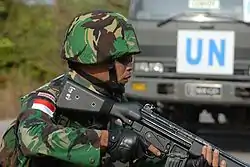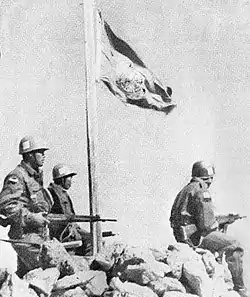Garuda Contingent
The Garuda Contingent (Indonesian: Kontingen Garuda, often abbreviated Konga) is a group of peacekeepers drawn from the Indonesian military that serve with the United Nations. Since its first mission in 1956, it has deployed to three continents.
| Garuda Contingent | |
|---|---|
| Kontingen Garuda | |
 An Indonesian soldier UN peacekeeper | |
| Active | 1957–present |
| Country | |
| Role | Peacekeeping |
| Nickname(s) | Konga |
| Engagements | Various peacekeeping missions with the United Nations |
History
The Garuda Contingent was first deployed to Egypt and Israel in November 1956 as part of the United Nations Emergency Force. It was first under the command of Lieutenant Colonel Hartoyo, who was later replaced by Lieutenant Colonel Suhadi Suromihardjo.[1]
The next two contingents were sent to the Congo. The first contingent consisted of 1,074 troops and was led by Colonel Prijatna (later replaced by Lieutenant Colonel Solichin); this contingent served from September 1960 to May 1961. The second contingent to the Congo consisted of 3,457 troops and was led by Brigadier General Kemal Idris (later replaced by Colonel Sabirin Mochtar); this contingent served from 1962 to 1963 and saw one casualty.[1]
The Garuda Contingent's fourth and fifth deployments were to Vietnam in 1973 and 1974, towards the end of the Vietnam War. This was followed by a sixth deployment to Egypt after the Yom Kippur War under the command of Colonel Rudini. The Garuda Contingent later returned to Vietnam and Egypt for a seventh and eighth deployment, respectively.[1]
After an eight-year hiatus, the Garuda Contingent deployed as part of the United Nations Iran–Iraq Military Observer Group under the command of Lieutenant Colonel Endriartono Sutarto, then Lieutenant Colonel Fachrul Razi and Johny Lumintang.[1]
In 1992, five Garuda Contingent members participated in the United Nations Operation in Somalia I under the command of Lieutenant Colonel Bibit Santoso. This was later reduced to four soldiers, under the command of Major CZI Budiman.[1]
During the Bosnian War, the Garuda Contingent deployed medical officers and military observers in their fifteenth mission. This was not well received by the Indonesian populace, who wished that the soldiers took a more active, military role.[2] This was followed by a deployment to Georgia and a 15-man deployment to Mozambique in 1994. That same year they were also deployed to the Philippines under the command of Brigadier General Asmardi Arbi (later replaced by Brigadier General Kivlan Zein) to help deal with the conflict between the Moro National Liberation Front and the Philippine government.[1]
In 2003, the Garuda Contingent deployed on its twentieth mission, to the Democratic Republic of the Congo. A total of 171 troops deployed originally, including 32 medical staff and 28 marines. They were deployed with peacekeepers from Nepal, India, and Bangladesh with the peacekeeping mission being led by France.[3] As of 2009, the focus had shifted to infrastructure and a seventh contingent had been deployed.[4]
The Garuda Contingent was part of the United Nations Interim Force in Lebanon. In August 2010, two of its soldiers were criticized after they escaped from clashes between Israel and Lebanon by fleeing in a taxi.[5]
Deployments

.jpg.webp)
| Location(s) | Deployment Name | Period |
|---|---|---|
| Egypt, Israel (UNEF) | Garuda Contingent I | November 1956 – September 1957 |
| Zaire (UNOC) | Garuda Contingent II | September 1960 – May 1961 |
| Zaire (UNOC) | Garuda Contingent III | 1962–1963 |
| Vietnam (ICCS) | Garuda Contingent IV | January – August 1973 |
| Vietnam (ICCS) | Garuda Contingent V | August 1973 – April 1974 |
| Egypt (UNEF) | Garuda Contingent VI | December 1973 – October 1974 |
| Vietnam (ICCS) | Garuda Contingent VII-A and VII-B | April 1974 – June 1975 |
| Egypt (UNEF II) | Garuda Contingent VIII (1–9) | September 1974 – October 1979 |
| Iraq, Kuwait (UNIIMOG) | Garuda Contingent IX | August 1988 – November 1990 |
| Namibia (UNTAG) | Garuda Contingent X | June 1989 – March 1990 |
| Kuwait (UNIKOM) | Garuda Contingent XI (1–5) | 1992–1995 |
| Cambodia (UNTAC) | Garuda Contingent XII-A – XII-D | July 1992 – April 1993 |
| Somalia (UNOSOM I) | Garuda Contingent XIII | July 1992 – April 1993 |
| Bosnia and Herzegovina (UNPROFOR) | Garuda Contingent XIV | November 1993 – 1997 |
| Georgia (UNOMIG) | Garuda Contingent XV | October 1995 – November 1995 |
| Mozambique (UNOMOZ) | Garuda Contingent XVI | June 1994 – December 1994 |
| Philippines (Philippines - MNLF ceasefire monitors) | Garuda Contingent XVII | October 1994 – November 1994 |
| Tajikistan (UNMOT) | Garuda Contingent XVIII | 1995 |
| Sierra Leone (UNAMSIL) | Garuda Contingent XIX | 2001 |
| Democratic Republic of the Congo (MONUSCO) | Garuda Contingent XX | 2003 |
| Liberia (UNIMIL) | Garuda Contingent XXI | 2003 |
| Sudan (UNMIS) | Garuda Contingent XXII | 2008 – 2009 |
| Lebanon (UNIFIL) | Garuda Contingent XXIII | 2007 – 2011 |
| Nepal (UNMIN) | Garuda Contingent XXIV | 2007 – 2011 |
| Lebanon (UNIFIL) | Garuda Contingent XXV | 2008 – 2017 |
| Lebanon (UNIFIL) | Garuda Contingent XXVI | 2008 – 2012 |
| Sudan (UNAMID) | Garuda Contingent XXVII | 2008 – 2012 |
| Lebanon (UNIFIL) | Garuda Contingent XXVIII | 2009 – 2019 |
| Lebanon (UNIFIL) | Garuda Contingent XXIX | 2009 – 2018 |
| Lebanon (UNIFIL) | Garuda Contingent XXX | 2011 – 2018 |
| Lebanon (UNIFIL) | Garuda Contingent XXXI | 2011 – 2018 |
References
- Footnotes
- Jusuf, Muhammad (2003). "Pasukan Perdamaian Indonesia Bertugas Lagi di Kongo" [Indonesian Peacekeepers Deployed Again] (in Indonesian). Indonesian Army. Archived from the original on 28 September 2011. Retrieved 1 August 2011.
- Perwita 2007, p. 147
- Siboro, Tiarma (19 July 2003). "RI set for peace keeping mision (sic) to Congo". The Jakarta Post. Archived from the original on 12 August 2011. Retrieved 1 August 2011.
- "TNI sends replacement troops to Congo". The Jakarta Post. 15 October 2009. Retrieved 1 August 2011.
- "Criticism as Two Indonesian Soldiers Flee Lebanese, Israeli Battle in Taxi". Jakarta Globe. 5 August 2010. Retrieved 12 August 2011.
- Bibliography
- Perwita, Anak Agung Banyu (2007). Indonesia and the Muslim World : Islam and Secularism in the Foreign Policy of Soeharto and Beyond. Copenhagen: Nias Press. ISBN 978-87-91114-92-2.CS1 maint: ref=harv (link)